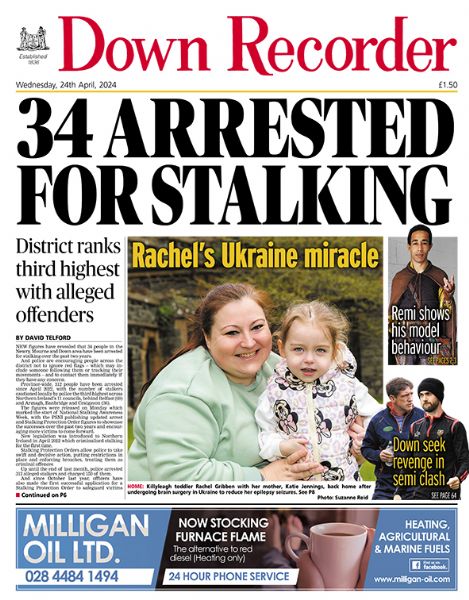Brother is challenged over diary entries
Brother is challenged over diary entries
10 December 2014
A FORMER Brother at Rubane House has said he has no memory of carrying out a series of assaults recorded by a principal of the children’s home.
The man, just a teenager himself when he began working at the De La Salle run home, told the Historical Institutional Abuse Inquiry he never abused any boy — but acknowledged he was “ill-prepared” for the job.
As the inquiry into child abuse at Northern Ireland institutions hears its final phase of evidence from Rubane House, the Brother’s account follows that of other staff members who have denied being personally responsible for any abuse.
The De La Salle Order admitted children were abused at the Kircubbin home at the start of the inquiry and has apologised. It does not, however, accept all the allegations.
The former Brother giving evidence on Monday, who came to Rubane House in the 1970s, said that after a year spent in the Kircubbin home he was not put forward by the Order to take his final vows.
After that, he said he went on to study child care and forged a long running career as the head of a children’s home, with no complaints made against him. He said at the time he was one of the few people qualified for the role and would later study social work at university.
Lawyer to the inquiry Joseph Aiken pointed to a statement made by one of the principal Brothers of Rubane, which recounts how the witness’s “aggression toward the boys” had caused concern during his time there.
In the statement the principal said he was “instrumental in preventing him taking his full orders”. Two other Brothers in training were treated similarly.
Reading from a diary also kept by the principal at the time, the inquiry heard Monday’s witness, who has the right not to be named, was the Brother linked to diary entries such as: “Brother xxx hit xxx on the leg with a stick — nasty”, and Brother xxx hits xxx in the dining hall.”
“I have no memory of either of those,” the witness replied.
Reading further diary entries relating to the witness, Mr Aiken read: “Brother xxx clobbered a few of the boys at line up”, and in an incident involving a brick being put down a toilet — “Brother xxx beat him again for reporting to me. Stupid man.”
The witness pointed out that if the De La Salle Order had concerns it did not stop them going on to fund him through a two year course to work with children, even though he had left the order.
He said he felt he was not put forward for full orders as he was “not as devout as others” and sometimes missed morning prayers.
Referring to a specific allegation made by a former resident to the inquiry, Mr. Aiken also asked the Brother if he could remember an incident involving the theft of wine from a cellar at Rubane.
A statement from the former resident was read to the inquiry, accusing the Brother of a violent response.
“He punched and kicked me all over the field,” the statement read. “I fell to the ground and was almost unconscious. When I came round there was blood on my nose and face and my face was badly bruised.”
The former resident said this was different to when he received “six of the best, adding: “to be fair I would have deserved this most of the time”.
The inquiry heard this incident was reported to police and that the man urged police to interview another resident he said was there at the time.
However, the inquiry heard that this second resident did not back up the account. He said he remembered the incident with the wine and the Brother trying to restrain the boy allegedly assaulted, who had been behaving in a way that endangered himself. He said he didn’t recall how it ended up but didn’t see him being assaulted.
“He gave me a lot of abuse for not supporting him,” this witness reported.
In his response on Monday, the Brother said he could not remember the resident, didn’t assault any child and found the allegations “very upsetting and stressful”.
Discussing in general terms the challenges the young Brother would have faced on entering Rubane, Mr Aiken said: “You were thrown in the deep end. Sink or swim. No training, no preparation. You would have been given no preparation for the boys with difficult backgrounds, with difficult issues you might encounter?”
The former Brother acknowledged there was no code of practice.
“You went about doing the job the best you can,” he said. “There was no guidance in terms of recording information.”
While acknowledging that he had no memory of any assaults, Mr. Aiken suggested this difficult environment could provide the context for such incidents occurring.
But while acknowledging he was “ill prepared” for a difficult job, the witness responded: “I would be ashamed if I had behaved in that way.
“I was quite a shy and retiring individual. We were working with them on our wits.”
Referring to the different time and culture of the 1970s, he pointed out that there was in general a “serious absence” of policies and procedures until the The Children (Northern Ireland) Order 1995.

